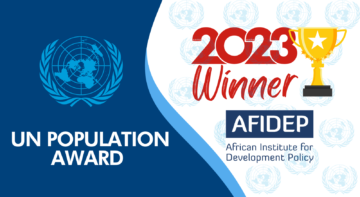News

The African Institute for Development Policy (AFIDEP) presented recent research findings on adolescent sexuality and the demographic dividend at the recently concluded Population Association of America (PAA) 2018 Annual Conference in Denver, Colorado, between 26 “ 28 April 2018. AFIDEP was represented at the conference by Dr. Nurudeen Alhassan, a Research Fellow at the Institute.
On Thursday, 26 April 2018, Dr. Nurudeen Alhassan made a poster presentation with the title: Strategies for Negotiating Sexual Abstinence Among Youth in Urban Poor Accra, Ghana. The poster focused on some of the means by which urban poor youth in Accra abstain from sex, manifesting in the adoption of a mix of social, psychological and physical strategies. Some of these strategies include: engaging in physical activity, faking sexual intercourse, sexual self-efficacy, prayers
On the second day of the conference, Dr. Nurudeen Alhassan was the discussant in a session titled Contemporary and Historical Fertility Transitions. The session involved presentations and discussions on fertility transitions across three different continents (Africa, Asia and Europe) spanning from 1600 to 2015. The main highlights of the session were:
- fertility and family formation strategies vary substantially among different social groups and in different geographical context, and even times;
- during the onset of the demographic transitions, people in the high socio-economic status are usually the front-runners in the transition process;
- Differences in fertility between social classes widen during fertility transition; and
- Social class (prestige) also mattered in determining family size and lineage survival in pre-transition societies.
On Saturday, 28 April 2018, Dr. Alhassan was also part of a session on The Demographic Dividend in Sub-Saharan Africa, where he made a presentation titled: Barriers to Maximising the Demographic Dividend in Southern Africa: Fertility and Labor Market Scenarios in Botswana, Namibia, eSwatini (formerly Swaziland) and Zimbabwe. The presentation highlighted the slow decline in fertility and low levels of income driven by high youth unemployment and underemployment in these countries, which has and may continue to have an undermining effect on their prospects to maximise the benefits of the demographic dividend. The session was chaired by Jacques Emina from the University of Kinshasa, and the discussant was Parfait Eloundou- Enyegue from Cornell University.
Established in 1930, the PAA is a nonprofit, scientific, professional organisation that promotes the improvement, advancement and progress of the human race through research of issues related to human population. PAA members include demographers, sociologists, economists, public health professionals, and other individuals interested in research and education in the population field.
Related Posts





